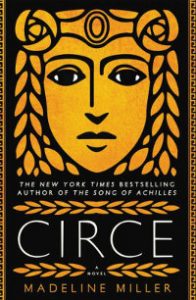Madeline Miller's Circe: Perpetual Outsider, Powerful God | No. 1 LibraryReads Author
 Like her Orange Prize–winning The Song of Achilles, Madeline Miller’s Circe revitalizes our appreciation of ancient Greek mythology and its profound insights into human nature, never mind its basis in the antics of the gods.
Like her Orange Prize–winning The Song of Achilles, Madeline Miller’s Circe revitalizes our appreciation of ancient Greek mythology and its profound insights into human nature, never mind its basis in the antics of the gods.
Not a retelling but an enriching of Circe’s story, the novel begins with Circe as a child scorned in her sun-god father’s household, follows her into exile when her gift for sorcery emerges, then gracefully folds in encounters with mythic figures not typically associated with Circe before introducing the celebrated Odysseus.
Portraying Circe as passionate and determinedly herself, the narrative clarifies her pained role as perpetual outsider and female in a male world without ever sounding tendentious. It’s magic, too, coursing with Circe’s powers and told in language that’s river-swift, unobtrusively modern, appropriately lyrical, and polished as bronze. Here’s Circe, before she knows her powers yet eager to make a man she loves immortal:
I was too wild to feel any shame. It was true. I would not just uproot the world, but tear it, burn it, do any evil I could to keep Glaucos by my side. But what stayed most in my mind was the look on my grandmother’s face when I said the word, pharmaka.
Pharmaka are the world-changing herbs at the root of sorcery, which the gods fear as beyond their powers. Before exile, Circe had already changed the uppity nymph Scylla into a monster (“I did it for pride and vain delusion,” she later reflects bitterly) and on her lonely island she becomes a committed practitioner, with readers feeling the tenacity and vigilance involved:
Let me says what sorcery is not: it is not divine power, which comes with a thought and a blink. It must be made and worked, planned and searched out, dug up, dried, chopped and ground, cooked, spoken over, and sung. Even after all that, it can fail, as gods do not. If my herbs are not fresh enough, if my attention falters, if my will is weak, the draughts go stale and rancid in my hands.
 Circe does get visitors—the god Hermes, for instance, and Daedalus, who takes her on a surprising visit to her sister. But when one rapacious crew attacks her in her own home, she enacts the revenge for which she becomes famous:
Circe does get visitors—the god Hermes, for instance, and Daedalus, who takes her on a surprising visit to her sister. But when one rapacious crew attacks her in her own home, she enacts the revenge for which she becomes famous:
His rib cage cracked and began to bulge. I heard the sound of flesh rupturing wetly, the pops of breaking bones.... He screamed, and his men screamed with him. It went on for a long time. As it turned out, I did kill pigs that night after all.
Initially, Odysseus’s men are transformed, too, but Odysseus, perhaps less wily than thoughtful, is soon Circe’s lover; she was wrong to have said, “Apparently the market for disgraced sorceresses is thin.” He also relates the horrors of war:
You promise mercy to spies so they will spill their story, then you kill them after. You beat men who mutiny.... When the great hero Philoctetes was crippled with a festering wound, the men lost their courage over it. So I left him behind on an island and claimed he had asked to be left.
Odysseus eventually leaves Circe behind, too, but their story is beautifully expanded here. If Circe correctly observes that “mankind is spreading across the world,” Miller effectively captures that tension between humans and gods. And she captures a sorceress from a time not our own and makes her achingly real.—Barbara Hoffert
 Created by a group of librarians, LibraryReads offers a monthly list of ten current titles culled from nominations made by librarians nationwide as their favorites. See the April 2018 list here and contact libraryreads.org/for-library-staff to make your own nomination.
Created by a group of librarians, LibraryReads offers a monthly list of ten current titles culled from nominations made by librarians nationwide as their favorites. See the April 2018 list here and contact libraryreads.org/for-library-staff to make your own nomination.
Photo by Nina Subin
ALREADY A SUBSCRIBER? LOG IN
We are currently offering this content for free. Sign up now to activate your personal profile, where you can save articles for future viewing









Add Comment :-
Comment Policy:
Comment should not be empty !!!